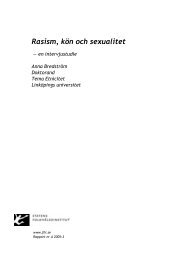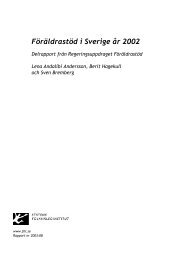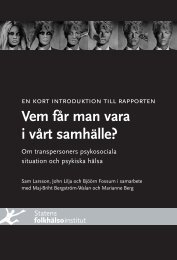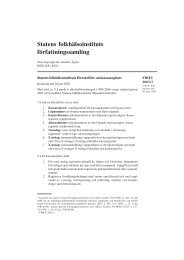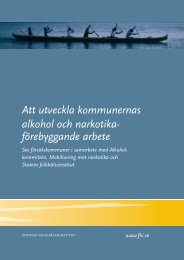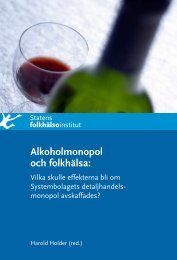Gambling motivation and involvement: A review of social
Gambling motivation and involvement: A review of social
Gambling motivation and involvement: A review of social
Create successful ePaper yourself
Turn your PDF publications into a flip-book with our unique Google optimized e-Paper software.
All predominantly biological, psychiatric <strong>and</strong> psychological research on gambling,<br />
including problem gambling prevalence studies, has been excluded from the<br />
<strong>review</strong>. There are a number <strong>of</strong> overviews <strong>of</strong> that literature [11–27].<br />
Economic works on the <strong>motivation</strong>s for gambling have been included but the<br />
relatively vast literature, explicitly on gambling or relevant to the decision-making<br />
<strong>of</strong> gamblers, regarding risk perception <strong>and</strong> cognitive heuristics, has been excluded.<br />
Thus, regret theory [28], the risky shift [29], base-rate fallacy [30], subjective probability<br />
[31], availability bias [32], counterfactual thinking [33] <strong>and</strong> prospect theory<br />
[34] are among the concepts <strong>and</strong> theories that will not be discussed. The reason for<br />
this is that the psychological component is usually predominant; commonly, these<br />
theories are tested in psychological experiments. For the same reason, most <strong>of</strong> the<br />
gambling research based on <strong>social</strong> learning theory [35] <strong>and</strong> similar approaches [36,<br />
37] is not included either.<br />
Within the economic, <strong>social</strong> <strong>and</strong> cultural sciences, studies in the following research<br />
areas were not included, as they say little or nothing about people’s motives for participating<br />
in gambling or the factors that influence their degree <strong>of</strong> <strong>involvement</strong>.<br />
• The socioeconomic impact <strong>of</strong> gambling, i.e. measurements <strong>of</strong> <strong>social</strong> costs <strong>and</strong><br />
benefits to society at large [38–42].<br />
• Impact <strong>of</strong> the siting <strong>of</strong> gambling venues <strong>and</strong> casinos on the local economy <strong>and</strong> the<br />
use <strong>of</strong> urban space, see e.g. the study by Nichols [43].<br />
• Changes in work commitment, attitudes <strong>and</strong> life satisfaction among jackpot winners:<br />
Binde [44] presents a comprehensive list <strong>of</strong> works.<br />
• Studies <strong>and</strong> discussions in political <strong>and</strong> policy sciences, including public affairs<br />
<strong>and</strong> administration, on gambling in society [45, 46].<br />
• Studies on gambling law <strong>and</strong> regulation (see Gaming Law Review).<br />
• Studies <strong>and</strong> discussions on responsible gambling [47–50].<br />
• Economic studies on revenue maximizing design <strong>of</strong> lotteries <strong>and</strong> other games<br />
[51–53].<br />
• <strong>Gambling</strong> taxation issues [54, 55, 56 Ch. 19 <strong>and</strong> Sect. M , 57].<br />
The <strong>review</strong> covers research <strong>and</strong> theory <strong>of</strong> current relevance. Few works older than<br />
fifty years are cited. Apart from ethnographic <strong>and</strong> mathematical studies, there is<br />
little empirical research on gambling older than that.<br />
This is not an exhaustive <strong>review</strong>. Not all works on the various subjects discussed<br />
are referenced. A selection is most <strong>of</strong>ten made with the effect that key works <strong>and</strong><br />
representative examples are cited. In some cases, however, the works on a certain<br />
issue are so varied with respect to content that all known works are cited.<br />
The intention is not necessarily to provide a “balanced” description – in terms <strong>of</strong><br />
publication volume <strong>and</strong>/or impact – <strong>of</strong> economical, <strong>social</strong> <strong>and</strong> cultural research on<br />
gambling. Research will be discussed in greater detail if it is especially relevant to the<br />
objective <strong>of</strong> this report, or if doing so is required to make it more comprehensible to<br />
readers with little or no prior knowledge.<br />
10 G A M B L I N G M O T I VAT I O N A N D I N V O LV E M E N T




